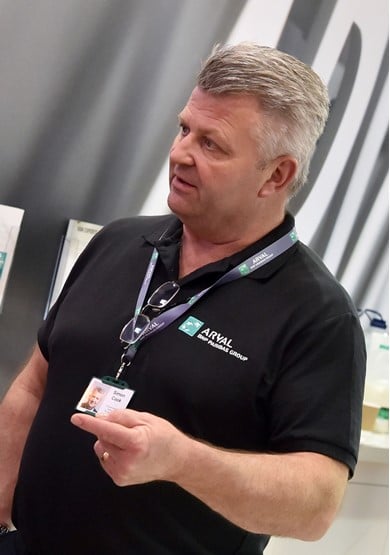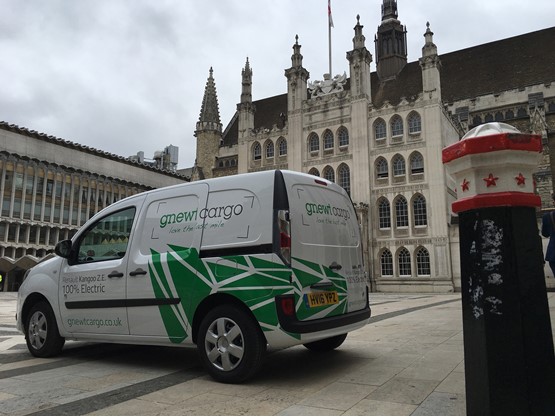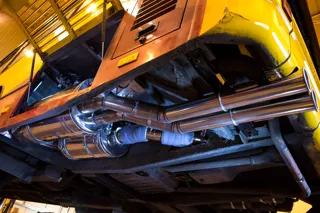Fleet operators face an array of choice when it comes to vehicle funding. While there is no one-size-fits-all approach to choosing the right method, getting it wrong can have severe implications.
Flexibility is becoming an increasingly important factor for fleet managers, as they juggle a range of factors to remain compliant with changing legislation and evolving business needs.
Different finance methods come with their own advantages and disadvantages.

Some, including whether vehicles stay on or off a company’s balance sheet, may fall into the hands of finance leaders rather than fleet teams.
Other methods could affect vehicle maintenance, lifecycles and the condition they have to be returned in and should be considered carefully.
Historically, commercial vehicle (CV) operators have been more likely to buy vehicles outright either using cash or external financing.
More recently, the trend has changed and more businesses are looking at contract hire, hire purchase and finance leasing.
Rental is also becoming increasingly popular, although it is usually utilised alongside another funding method.
Leasing/contract hire
Van operators are more likely to favour leasing, especially those with larger fleets. In the 2018 Fleet200 survey, more than half of respondents were acquiring vehicles through contract hire, with a further 21% using finance lease.
Leasing companies have become much better at servicing the CV market, with many now providing specialist divisions to deal with van fleet customers.
This year, the UK’s 50 largest leasing companies are responsible for funding more than 430,000 vans. The majority (90%) are provided on contract hire.
“Contract hire is becoming more and more popular for businesses operating a van fleet,” says Russell Adams, commercial vehicle manager at Lex Autolease.
“Amid fast-paced technological and regulatory change, decision-makers want to retain flexibility and make sure they get the right van for the job.
"The shift towards low emission vehicles, implementation of clean air zones and the prospect of updated Euro emissions standards are all increasing the demand for expert consultancy.
"As a result, we’re also seeing an increase in fully outsourced solutions, so decision-makers can always access specialist experience and knowledge.”
Contract hire provides the advantages of all-inclusive fixed monthly costs, with servicing, repair and maintenance (SMR) bundled in one price.
Hire periods can be set to match a company’s operating contracts and the entire monthly rental fee is tax-deductible.
However, if a business needs to end the contract early, the penalties can be high.
Stewart Wiseman (below), group fleet manager at Nationwide Window Cleaning, has a mixture of contract hire, lease purchase, hire purchase and outright purchase vehicles.

Now he is looking at the possibility of a full contract hire fleet with shorter replacement cycles of three years, following a recent business acquisition.
“We’d be giving all that risk possibly to someone else, which helps our budgeting and because of the synergy with the merged company, there are some benefits to be had,” Wiseman says.
He also knows from experience that using an external provider could save time.
Multiple options
Larger fleets, operating more than 500 vans, are more likely to have more than one funding avenue, according to the Fleet200 data.
The survey found that more than half (59%) of 63 operators rely on a sole funding route, with 35% opting for two and the remainder three or four.
Royal Mail operates the largest fleet in the UK, with 41,500 vans and 6,000 trucks.
It uses outright purchase and finance lease to fund its van fleet, using multiple leasing suppliers.
The company’s fleet director Paul Gatti says: “Royal Mail seeks to ensure that we obtain the right funding solution for all our capital needs.
"It is useful to have a variety of funding options available to ensure we have the best one and also to provide alternatives should different funding sources become uncompetitive.

“For the same reasons we find it useful to have a variety of funding providers. Selection of the appropriate funding option depends on a number of factors but is driven by business need and total cost of ownership considerations.”
Fleet200 operators are continuing to favour outright purchase for HGVs. Contract hire is the second most popular funding method, with 36% of those surveyed using it.
Royal Mail uses a combination of outright purchase, contract hire, finance lease and flexible rental to fund its 6,000-strong truck fleet.
“More customers are moving away from buying, or buying direct from manufacturers, and moving towards contract hire and leasing specialists,” says David Potter, commercial development director at Asset Alliance.
“There is definitely a change in the marketplace. Ten years ago, contract hire terms was traditionally four to five years.
"That is changing to become much shorter. Typically, we are seeing contract hire terms of two-to-three years for standard tractor units.
“Mileages are becoming a key factor. The market has gone from a standard of 120,000 per year to 150-200k per year, where they are trying to sweat the asset further.
“Fleet operators want contract hire – they want to know when they take that asset they will get a fixed cost for the duration of that term.
"They don’t have to worry about having the asset on the balance sheet, for now, and they don’t have to worry about residuals,” adds Potter.
Lease accounting changes, which take effect from January, will mean leased assets (including vehicles on operating leases) will be brought on to some companies’ balance sheets. Keeping vehicles off-balance sheet helps to keep the debt-to-equity ratio low.
The rules are being introduced by the International Accounting Standards Board (IASB) with the aim of giving a more complete picture of a company’s financial position.
They apply only to companies that report under IASB, such as those listed on the stock exchange. The generally accepted accounting principles (GAAP), under which the majority of small- to medium-size companies report are not affected.
Gerry Keaney, British Vehicle Rental and Leasing Association (BVRLA) chief executive, says: “Vehicle leasing continues to grow in popularity and this has very little to do with any balance sheet advantages.
“Its main value comes elsewhere, sheltering companies from the risk of fluctuating vehicle values, providing them with extra flexibility and purchasing power and freeing-up precious working capital that would otherwise have been spent buying an asset.”
According to Peter Jardine, Countrywide’s group fleet manager, decisions on a fleet’s asset funding are usually down to the view of the finance director.
“Some companies might not want to have as much liability on the balance sheet. The lease accountancy changes make the decision easier (if) there is no longer the off-balance sheet advantage to contract hire,” he adds.
Rental companies are promoting the fact that the forthcoming standard allows organisations to keep a leased asset off-balance sheet if the duration of the lease is less than 12 months and the treatment of the asset is uniform across all vehicles of a similar type.
Caroline Sandall (below), deputy chair of fleet representative body ACFO, urged fleets to be cautious if adopting a fleet-wide approach to switch to 12-month rentals, however.

She says: “I understand why rental companies are looking at this and that – for some fleets – this may be attractive.
"However, it is likely to be limited to certain fleets where their company portfolio is such that this change in accounting rules does matter or where the admin burden is such that they want to avoid it.”
Rental
Boosted by uncertainty during the last recession and the current fears over Brexit, rental provides less risk and gives businesses the flexibility to scale fleet size up and down to suit seasonal demands.
Flexible rental is most popular among business services and construction businesses, with 15% and 13% of vans funded via that route according to the Fleet200 data.
“The options open to CV operators are contract hire with a fixed term (associated early termination) or outright purchase.
"Rental gives them both the flexibility to adjust their fleet up and down, as their business experiences peaks and troughs. It’s also off balance sheet,” says Stuart Russell, specialist vehicle director at Europcar.
“Fleets are nervous about tying up their assets and their cash. Long-term rental has been a good solution for them.”
Stantec Treatment exclusively uses flexible rental to fund its vans after switching from contract hire. The company calculates a saving of around £25,000 a month.
Having contract hired vans on four-year replacement cycles, Stantec fleet manager Leah Fletcher says: “We undertook a cost analysis early in 2017 and found that flexible rental would be far more cost-effective. The decision has proved very successful.”
Stantec’s van demand varied through the year, typically peaking in winter, meaning some vehicles were under-used at other times.
However, additional vans on short-term contracts would also be introduced due to increased workload. It found that SMR downtime could increase when vans moved into their third year and beyond, adding to costs.
Fletcher adds: “We moved to flexible rental chiefly to make financial savings and reduce vehicle downtime, completing the changeover in spring 2018. The ability to off-hire at just a week’s notice and with no cost penalty is advantageous.”
Simon Cook, LCV leader at Arval, (below) said: “An interesting trend we have seen is fleets starting to make increased use of medium-term rental, often to scale-up for specific contracts and seasonal peaks in demand.

"We see this as a growth area, providing flexible fleet provision that is more cost-effective than traditional short-term rental solutions.”
The perfect blend for a medium-to-large corporate is a combination of rental and contract hire/outright purchase, according to Russell.
“If you have a consistent level of business you can complement that with a bunch of flexi-lease rentals, giving flex but also a core fleet that may cost slightly less than going full rental,” he says.
Although rental is often seen as a short-term solution, fleets are increasingly turning to rental for daily, medium and long-term use to safeguard against market uncertainty.
David Brennan, CEO of Nexus Vehicle Rental, says: “Rental offers flexibility, meaning you only pay for vehicles when needed, minimising costs and enabling fleet capacity to be rapidly scaled up to cope with peak periods.”
Last year, Nexus launched a HGV rental service due to strong customer demand. While rental was only used as the main funding method by two Fleet200 fleets in this year’s survey, 14 said that they use it as a secondary method.
Brennan believes there will be further growth in this area as more operators seek greater flexibility.
Outright purchase
While leasing was the most dominant funding method among Fleet200 operators, outright purchase is the most popular funding method across a broader range of fleets.
The 2017 Sewells Market Barometer found that 59% of fleets funded some vehicles through outright purchase.
Many of the fleets interviewed for the survey referenced flexibility; either by holding onto vehicles for longer when needed, or disposing of them earlier when times are tough.
Public sector fleets were the most likely to own vehicles outright in the Fleet200 survey, followed by the utilities sector.
John Lewis Partnership has a fleet of more than 3,500 CVs, all owned outright. Its general manager – fleet Justin Laney said: “Our fleet model is to buy equipment that is designed for our purposes.
"But, because it is specialised and the vehicles are on a long life cycle, it is less attractive to leasing companies because the residual value is low.”
“So we fund the fleet and we maintain it in-house to keep standards high and the costs down. It also gives us the flexibility to de-fleet early if that is appropriate.”
West Yorkshire Police is one of the public sector fleets to buy its van fleet. Head of transport Steve Thompson says: “We do benchmark against the leasing sector, but outright purchase remains more cost-effective.”
Alternative fuels
As operators adopt electric, gas and other alternatively fuelled vehicles, the funding trends are likely to change.
The degree of flexibility around funding an electric or gas vehicle is very different to traditional diesel because of the unknowns regarding future values.
“Gas is relatively new to the marketplace,” explains David Potter of Asset Alliance. “There is a big capital increase, unknowns about maintenance and long-term performance, but also who wants that asset in second life.
“There is a market for older diesels from an export point of view. We do not know if that will exist for gas vehicles.”
He believes operators are less likely to buy gas or electric trucks outright, but says the challenge for funders is getting people to understand the wholelife cost model.
“If you take a gas vehicle it might be 75-80% more expensive than a diesel, plus you have an increased maintenance cost. On the model of quoting monthly, gas will appear a lot more expensive,” Potter adds.
“The saving is on fuel. When you measure that over a three- to five-year period, the cost benefit starts to become apparent.”
Contract terms are, therefore, likely to be longer for those vehicles, as it is the only way to enable operators to get the payback.
Gnewt Cargo is the only business featured in this year’s Fleet 200 with a 100% electric fleet. Alphabet and DriveElectric provide Gnewt’s 60 electric vans.

Initially, Gnewt Cargo bought its vans. But, as the company expanded, it needed cash to invest in the business rather than in vehicles.
Also, electric vehicle technology was moving at such a pace that it didn’t want to own vehicles for many years and find they were outdated.
“We initially worked with DriveElectric because it was tailored towards plug-in vehicles and it was smaller and offered a personal approach, which I like.
"Some four or five years ago Alphabet was introduced because of our requirement for a large number of vehicles quickly,” says Gnewt director Sam Clarke.
“It is not just numbers on a page and the unit cost of vehicles, which makes it different from buying diesel vans.
"It is about what is right for a business now and what will be right in the future, the recharging infrastructure, the power supply and other factors. It is no longer just about the van,” Clarke adds.




















Login to comment
Comments
No comments have been made yet.